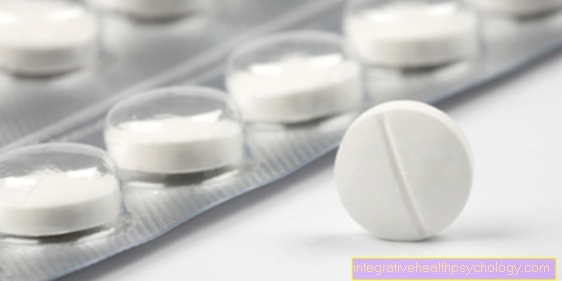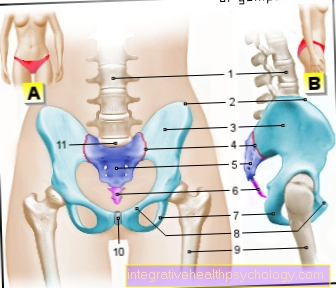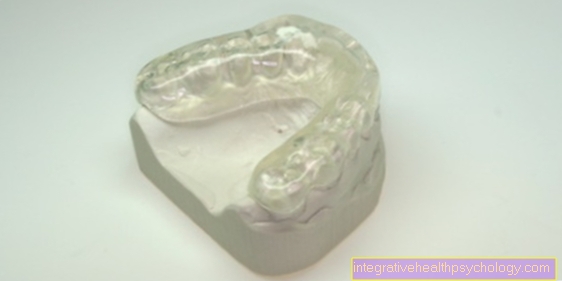Klacid®
definition

Klacid® belongs to the group of so-called macrolide antibiotics and inhibits the growth of bacteria.
Areas of application for Klacid®
The use of Klacid® is indicated for all diseases caused by pathogens that are sensitive to clarithromycin and that can be reached through oral treatment.
These include:
- acute bronchitis
- Chronic bronchitis
- lung infection (pneumonia), as well as atypical pneumonia (Mycoplasma pneumonia)
- Tonsillitis (Tonsillitis)
- Sore throat (Pharyngitis)
- Sinus infection (Sinusitis)
- Lichen (Impetigo contagiosa)
- Sore rose (Erysipelas)
- severe inflammation of the hair follicles, deep inflammation of the hair follicle
- Wound infections
Contraindications
Klacid® must not be taken if you are allergic to the active ingredient clarithromycin or other macrolide antibiotics (e.g. Erythromycin) consists.
In addition, taking Klacid® should be avoided if one of the following medicines is taken at the same time:
- Antihistamines (e.g. Terfenadine, astemizole)
- Means to stimulate bowel movement (e.g. Cisapride)
- Psychotropic drugs (e.g. Pimozide)
- Drugs against migraine or certain circulatory disorders (e.g. Ergotamine or dihydroergotamine)
- Drugs to lower the Cholesterol level (e.g. Statins)
- in the presence of cardiac arrhythmias (e.g. QT interval lengthening)
- impaired kidney / liver function not when taking gout-Medications
- with severely impaired liver function
Application / dosage of Klacid®
Klacid® is taken according to the doctor's instructions. The standard dosage corresponds to a 250mg intake twice a day (so 2 film-coated tablets a day), at intervals of 12 hours (in the mornings and the evenings).
It may be necessary to adjust the dosage depending on the illness and the individual metabolic performance of the patient. Klacid® is swallowed whole with a glass of water regardless of meals.
Side effects
The most common side effects reported in adults and adolescents were:
- stomach pain
- diarrhea
- Nausea
- nausea
- Impairment of the sense of taste
Occasionally the following can occur:
- Gastrointestinal inflammation
- Yeast colonization
- vaginal infection
- severe reddening of the skin
- Decrease in concentration white blood cells
- strong increase in platelets
- Agranulocytosis (Decrease in granulocytes)
- Lack of platelets (Thrombocytopenia)
- anaphylactoid / anaphylactic reactions (acute shock)
- Decreased appetite to complete loss of appetite, lower Blood sugar level (Hypoglycemia)
- psychiatric illnesses like insomnia, Anxiety, nervousness, screaming, confusion, depersonalization, depression, Disorientation, hallucinations, nightmares
- Loss of consciousness, movement disorder, drowsiness, drowsiness, tremors
- Seizures
- Odor disorders, Sensory disorders
Please also read our article on this Antibiotic side effects
Interactions
When taking Klacid® and other medications at the same time, there may be interactions.
These influencing drugs include the following:
- Medicines to stimulate bowel movement (Cisapride)
- Medicines for the treatment of certain mental illnesses (Pimozide)
- Medicines to treat Allergies (Astemizole, terfenadine)
- Medicines used to treat migraines and certain circulatory disorders (Ergotamine, dihydroergotamine)
- Medicines to lower the Cholesterol level (Lovastatin, Simvastatin)
- Medicines used to treat fungal diseases (Fluconazole)
- Medicines To Treat HIV Infection / AIDS
- Medicines for irregular heartbeat (Antiarrhythmics)
- Medicines to treat gout (Colchicine)
- Medicines to treat Heart failure (Digoxin)
- Medicines to treat erectile dysfunction (Sildenafil, Tadalafil, Vardenafil)
- Medicines to treat asthma (Theophylline)
- Medicines to treat increased urination (Tolterodine)
- Sleeping pills (Triazolobenzodiazepines such. B. alprazolam, midazolam, triazolam)
Klacid® during pregnancy / breastfeeding
An increased risk for Miscarriages is possible, but not yet proven. Taking it during pregnancy should therefore be avoided if possible.
Klacid® and its active breakdown product pass into the breast milk, so that it is in the breastfed infant Diarrhea and fungal colonization can come from the disturbed intestinal flora.
Before treatment with the active ingredient clarithromycin, breastfeeding or the Breastfeeding be paused.





























